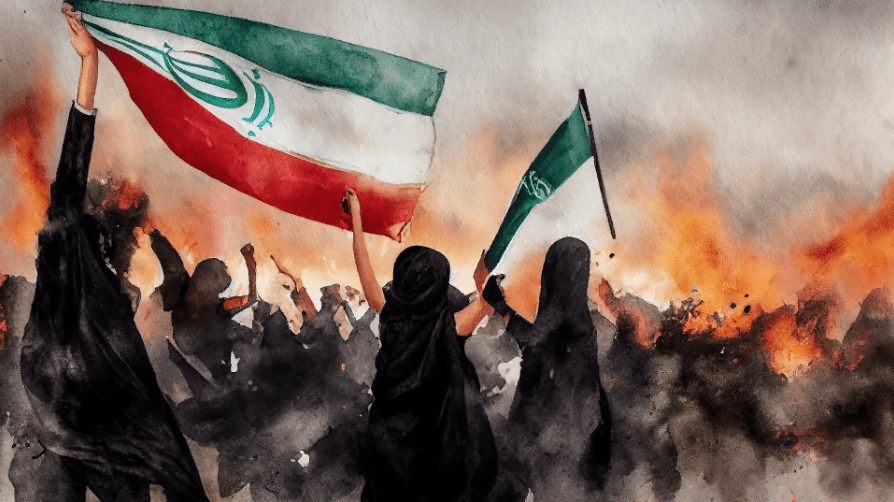
Can you picture living in a nation where your government has the power to execute you for defying a clothing code, imprison you for ten years for posting a video of you dancing with your fiancé, or abduct you for having the audacity to express your opinion?
In such a location, Iranians reside. Additionally, killing sprees and kidnappings are becoming standard responses by the Iranian regime to the ongoing nationwide rallies calling for an end to the theocracy.
After Mahsa Amini was killed by Iran’s purported “morality police” in September of last year, protests started. The murder victim, who was 22 years old, was accused of donning her headscarf “improperly.” Seven months later, the Iranian people continue to demonstrate against the regime in the streets.
This is only the most recent outburst of resentment directed at Iran’s theocratic government, which was forcefully installed in 1979 as a result of the Iranian Revolution. This and other Islamic governments have repeatedly demonstrated how dangerous political regimes can be, especially when they can pass off their breaches of human rights as acts of religious piety.
Islamic fundamentalists support the idea that the state should be run according to sharia law, which is derived from the Quran and Hadiths. Their ideas for particular policies range from establishing a worldwide caliphate with one government dominating the entire planet to combining democratic institutions and sharia-based law. But despite their disagreements, Islamic fundamentalists generally concur that sharia law ought to form the cornerstone of any system of government.
Consider the fundamentalist activists I know who attend reputable Indonesian universities like Universitas Indonesia and Bandung Institute of Technology.
The majority of them believe that homosexuality should be illegal and that women should not pursue employment but instead should stay at home.
While not all Muslims actively seek to violate people’s rights, some do. They frequently use democratic institutions to pass rights-violating, sharia-based legislation, which tramples on freedom of expression by punishing blasphemy, requiring women to wear hijabs, and censoring literature.
Furthermore, they frequently try to curtail economic freedom by requiring financial institutions to adhere to sharia law. For instance, according to the Quran, “Allah has permitted trading and forbidden interest. Those who consume interest will stand on the Day of Judgement like those driven insane by Satan’s touch.”
Look at Egypt to understand how radical Muslims abuse democratic institutions. During the Arab Spring, Egyptians overthrew Hosni Mubarak’s government and installed Mohamed Morsi as president, establishing the Muslim Brotherhood as the country’s dominant political force. Shortly after, the new administration drafted a new constitution designating sharia law as the main legal framework. As the violence against them increased—especially church burnings—and authorities failed to disperse the rioters, thousands of Coptic Christians fled the country.
However, winning elections is not always necessary for an Islamic party to have an impact on a nation’s course. Between 2004 and 2009, extremist and moderate Islamist parties in Indonesia won about 22% of all seats. However, their members were successful in convincing nationalist and secular parties to outlaw pornography in the nation, and in 2014 they went further by utilizing the Ministry of Informatics to censor websites like Reddit and Vimeo.
While some organizations, like the Muslim Brotherhood in Egypt, attempt to enact sharia law through new laws, many others turn to violence. The governments in Iran, Afghanistan, Qatar, and Saudi Arabia are current examples. Regimes in those nations aggressively frighten and enslave the populace to enforce a stringent interpretation of sharia law.
The Islamic State (IS, also known as ISIS, ISIL, and Daesh), which seeks to build a world caliphate, is perhaps the most extreme example. In order to do this, IS has carried out a great number of terrorist assaults across the world, such as the shootings at the Paris offices of Charlie Hebdo, the bombing of Manchester Arena, and countless more atrocities in Syria and Iraq.
The pattern is obvious: extreme Islam, as appropriated by political regimes to further their objectives, calls for the infringement of personal freedoms. Fundamentalist citizens may also be coerced into committing crimes against humanity on behalf of those regimes.
Therefore, if we are concerned about defending individual rights, we must strike a careful balance: We must, of course, recognize individuals who practice Islam in a peaceful manner while being on the lookout for its possible application as a political tool.
Check out our Free Society video playlist by clicking the icon below for additional information on relevant topics.






